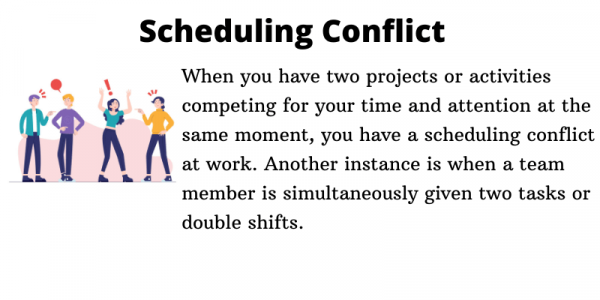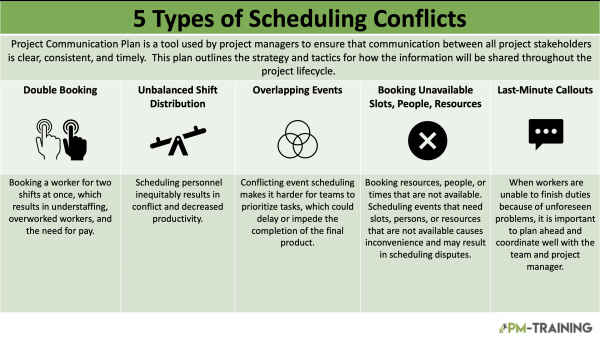Scheduling conflicts are one of the major conflicts that occur during the completion of the work in all kinds of projects. This article describes what scheduling conflicts are and various types of scheduling conflicts. Next, it describes why scheduling conflicts arise and continues with the best methods for preventing and handling them.
Your task as a project manager is to understand the nature of scheduling conflicts and the best ways to reduce their negative impact on your team’s effectiveness.
What are scheduling conflicts?
Different parties are involved in projects and this causes conflicts. The majority of such conflicts tend to be associated with project scheduling. Before going further into this topic it is necessary to define the term. Scheduling conflicts in a project management context occur when an employee or a team is given two tasks or two shifts at the same time.
So, based on this, it could be derived that conflict scheduling is something related to time management and task distribution. It must be emphasized that it is your duty as a project manager to manage these crucial aspects of a project. Furthermore, as a manager, you must be aware that your duty does not consist only of preventing such conflicts, and that you are also responsible for controlling and resolving such conflicts too.

Types of scheduling conflicts
- Double booking
Double booking occurs when an employee is scheduled for two different shifts which happen simultaneously. These shifts could happen to take place at the same or different locations with the latter having additional negative effects. The cost of having people called to perform tasks for two different stores and two different managers is quite high and can lead to understaffing and overworked workers. In addition to this, you as a project manager must be aware that trying to compensate for such mistakes is a rather burdensome task.
- Unbalanced shift distribution
This scheduling conflict happens when certain employees are scheduled more than others. As a project manager, you must know that making this mistake could lead to conflict between team members. For example, allowing an employee to always choose his preferred shift would necessarily lead to complaints from others. From a wider perspective, these complaints could be a source of lower productivity levels.
- Overlapping events
This type of scheduling conflict occurs when the end of an event tends to overlap with the beginning of another event. This might push you to prioritize one or the other events and thus lead to putting one or both teams in rather difficult situations. Practically, this will cause the postponement of an event or will require the teams to run back and forth between their tasks (events). Again, this scheduling conflict type might lead to a domino effect that will hamper the proper finalization of the products.

- Booking unavailable slots, people, or resources
As the name implies, this scheduling conflict happens in those situations when a manager books events with slots, people, or resources that are not currently available. For example, scheduling an online meeting between two project team members that live in incompatible time zones would be inconvenient at least for one of them.
This is a rather usual problem when managing a big team. A practical piece of advice for you as an aspiring project manager would be to always confirm the availability of slots, people, and resources before taking any decision to move further with the tasks.
- Last-minute callouts
Last-minute callouts occur when your employees are not able to complete a task and they are notified about that at the last minute. It must be emphasized that this scheduling conflict often tends to happen as a result of unexpected issues such as when people are sick or when they need to travel urgently. Proper coordination between you as a project manager and your team will always help in alleviating such situations.
Why do scheduling conflicts arise?
Some of the main factors that lead to scheduling conflicts are:
- Inaccurate estimation of the time it takes to complete a tasks
- Inaccurate forecasting of the need for resources
- Improper understanding of the project scope (work to be done)
- Improper communication between the team regarding the schedule
9 Ways to Avoid Scheduling conflicts
- Publish the schedule in advance
Publishing the first draft of the schedule to your employees is always a very helpful thing as it allows them to plan accordingly and make necessary changes.
- Make the schedule always available anywhere and anytime
Your employees must have access to the schedule all the time. Modern workforce management tools are very useful in this regard.

- Use the technology to your advantage
Using various scheduling software will help you as a project manager to effectively set tasks and appointments. It is also the most efficient way for you to prevent scheduling conflicts.
- Design an availability chart
The availability chart will assist employees in finding their substitutes when necessary. This chart demonstrates the times when employees can work aside from their regular shifts.
- Utilize the backups properly
Keeping backups in the context of scheduling conflicts means having a list of people who are able to complete certain tasks if problems arise
- Be flexible and suggest another time
Sometimes you have the possibility of changing the schedule for a given task. Clients will rather often demonstrate flexibility in this regard.
- Be empathetic with the project team
As a project manager and leader, you must understand that scheduling conflicts and that you should not make things worse by blaming others. Instead, you must focus on preventing similar mistakes from happening.
- Encourage proper team communication
Allowing the team to take an active role in the scheduling process will always greatly benefit you as a manager.
- Budget for breaks
You must always consider breaks when designing an employee schedule. It is vital that your workers are able to perform at their peak.

- Utilize a centralized work schedule
There should be a central location which stores all necessary information about the employee and their working time and location.
- Allow the staff to make suggestions
In order to avoid wasting time, staff can sometimes informally take part in making suggestions for the scheduling.
Scheduling conflicts are an almost inevitable part of any project. When trying to complete a project it is necessary for you as a project manager to always take into consideration the need to properly handle limited time, financial, and most importantly human resources in order to reduce the probability of unnecessary scheduling conflicts.
This guide on scheduling conflicts provided a rather comprehensive overview of scheduling conflicts, when they arise, and what are the best ways to handle them. The nature of modern complex projects makes it a rather challenging task, but with the plethora of resources, experience, and technological advances this is always a manageable task for the prudent project manager.
How do you show conflict in scheduling in MS projects?
When MS Project detects a potential scheduling conflict with a manually scheduled task, it generates a warning and changes the setting of the Warning field from the NO option to YES.
How do I resolve resource overallocation in the MS project?
The easiest to fix that overallocation is to delay one of those tasks. Ideally, this should happen with a task with lower priority than the others.
